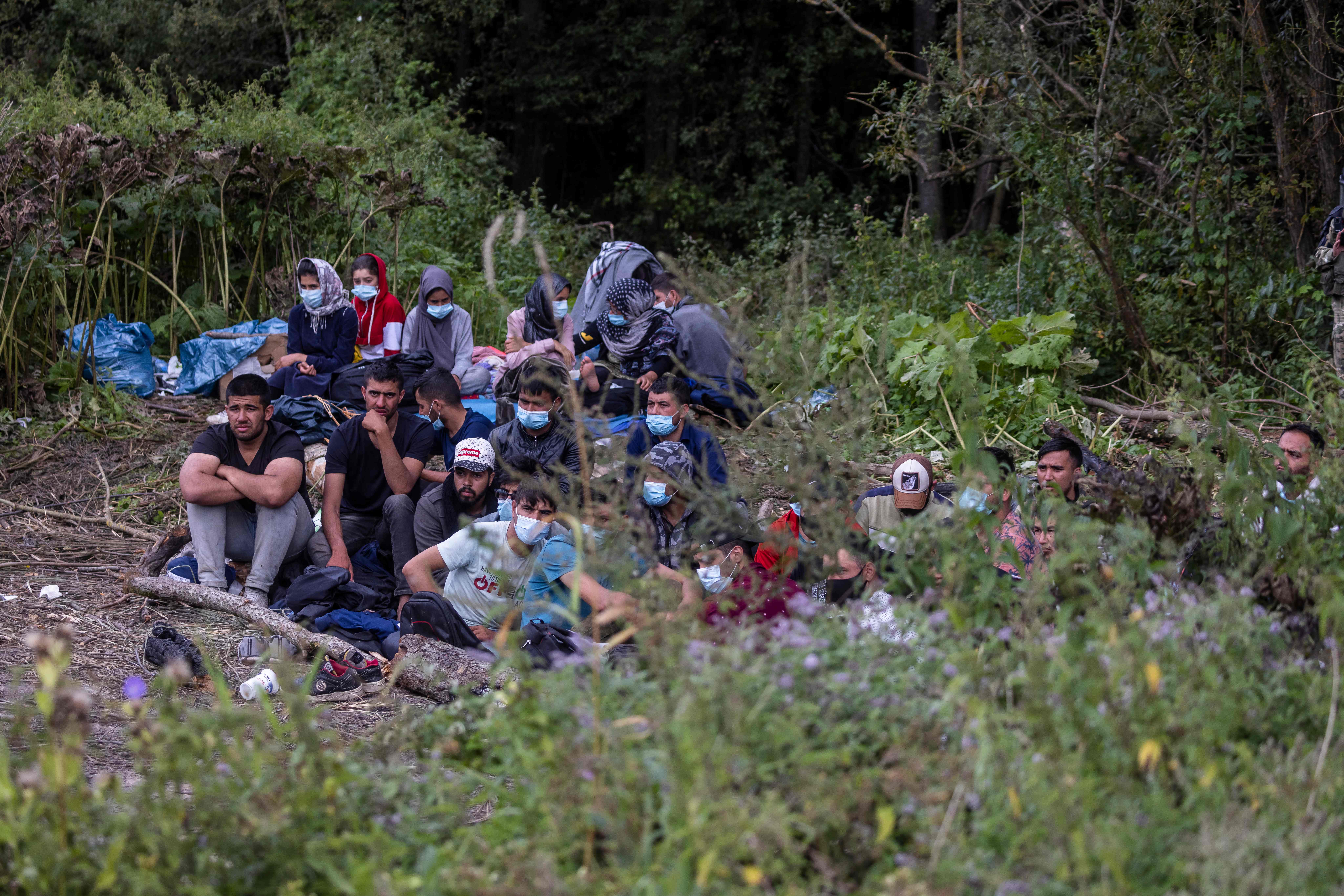Refugees denied entry to Poland ‘surviving on grass and leaves’ at Belarus border
Poland’s government accuses Belarus of ‘weaponising’ migrants against its EU neighbours, but lawyers tell William Nattrass the refugees - including dozens of Afghans - are now stranded in ‘extremely inhumane conditions’

Polish lawyers have banded together to represent a group of Afghan migrants facing horrific conditions while stranded on the country’s border with Belarus.
Belarus stands accused of pushing migrants and refugees from war-torn countries in the Middle East, including Afghans, towards its borders with Poland, Lithuania and Latvia over recent weeks.
With increasing numbers seeing the route as a gateway to the EU, concerns are mounting about the humanitarian situation facing those trying to enter the bloc from the east, who have been stranded in strips of no-man’s land for weeks on end.
Now, a team of lawyers from the Warsaw District Bar Council have volunteered to represent a group of 24 Afghans who have been stranded for over two weeks at Usnarz Gorny, on the Polish border.
The group of migrants sits trapped between Polish border police who will not allow them entry, and Belarusian guards who refuse to let them back in.
“We are talking about people detained at the border in extremely inhumane conditions,” Grzegorz Kukowka, spokesperson for the Warsaw District Bar Council, told The Independent.
“They are without access to food and water, toilets or even a doctor – the most urgent concern is the direct threat to their health,” he said.
Conditions for the trapped migrants are dire. Maciej Konieczny, a left-wing politician in the Polish Sejm (parliament), claims they have had nothing to eat but grass and leaves for days, and only dirty water to drink.
“The Polish border, which is also the Schengen border, must be protected, as is our duty – but ignoring humanitarian principles is unacceptable,” said Konieczny.
“We are dying – please help us,” read a message seen through binoculars scratched on a piece of wood near the migrants’ camp on Monday morning.
When contacted with questions about the situation facing the migrants, the Polish border police was unavailable for comment.
On Monday, the Polish government tried to negotiate the provision of basic humanitarian aid for those trapped in Belarus. At the same time, though, it announced that its border with Belarus would be closed and a 2.5-metre fence constructed to keep people out.
Belarus is being accused of using migrants as a weapon against the EU in retaliation for fresh economic sanctions imposed on Minsk by the bloc this year. Alexander Lukashenko’s government is said to be allowing people from war-torn Middle-Eastern countries to enter Belarus, before pushing them out towards Schengen zone countries.
“The use of immigrants to destabilise neighbouring countries is a clear violation of international law and qualifies as a hybrid attack on Lithuania, Latvia and Poland, and thus against the entire European Union,” read a joint statement from the prime ministers of the three EU neighbours.
It means the Polish government’s seemingly callous treatment of those trapped at Usnarz Gorny is made more complicated by its determination not to let Lukashenko’s aggressive policy pay off.
“The government stresses that this is hybrid warfare on the part of Lukashenko. This contrasts with the stance of the opposition, which highlights the humanitarian plight of those at the border,” Andrzej Turkowski, from the Polish Robert Zajonc Institute for Social Studies, told The Independent.
“There is a clash of logics here: between those who stress national security, and those who stress the need to provide help. This is what makes the situation so difficult – there is no good solution,” he added.
The situation with Belarus notwithstanding, Poland’s refusal even to process the migrants in question is meeting with criticism.
“At the moment, Poland has not even recognised our clients,” said Kukowka. “In our opinion, this is a direct violation of the Geneva Convention, which requires state parties to allow the submission of applications for international protection.”
But as concerns grow about a possible wave of mass migration following the Taliban’s takeover of Afghanistan, a number of European countries are adopting similarly defensive stances.
French president Emmanuel Macron has spoken of France’s need to protect itself from an influx of Afghan refugees, while Greece extended its border wall with Turkey as President Erdogan warned his country won’t be a “European refugee warehouse”.
The EU has no official plan for dealing with a possible migrant wave from Afghanistan, and memories of bitter disagreements over the 2015 migrant crisis have resurfaced in recent days.
Poland, along with central European allies the Czech Republic and Hungary, was then judged to have broken EU law by refusing to take in migrants allocated by the EU. Now, images of migrants waiting for succour at the Polish border suggest the country’s stance has not softened.
“This issue resonates throughout Polish society,” said Turkowski. “Conservatives argue that western Europe has experienced problems due to the cultural effects of migration, and don’t want to see a similar result here.
“The response to migrants depends on the political context. Poland has very large numbers of migrants from countries like Ukraine and India. But when it comes to migrants from the Middle East, the question overlaps with other issues, such as Polish autonomy, power relations with the EU, and national culture.”
Poland is now faced with an unenviable choice: take in the stranded migrants, and in so doing validate Lukashenko’s brutal use of refugees as a weapon against the EU; or refuse to help those in dire need of protection on its doorstep. How it resolves this humanitarian dilemma may guide its policy for future waves of migration from the Middle East.






Join our commenting forum
Join thought-provoking conversations, follow other Independent readers and see their replies
Comments